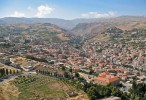It might not be one of the most populous countries in the Middle East, with a mere 2.2 million residents, but Kuwait still manages to draw in some of the largest names in the regional and global hospitality industries. Last year, Hilton introduced two brands at The Avenues Mall in Kuwait City, and this year saw Four Seasons open its property in the country.
It is hardly surprising that hoteliers want in on the action where Kuwait is concerned, especially as the country is expecting 570,0000 international visitors by 2027, up from a 2017 visitor forecast of 368,000. But while a bright future is predicted in terms of visitor numbers, a closer look at hotel performance indicators for over the last year reveals a different picture.
TRI Consulting’s associate director for the Middle East, Chris Hewett, citing data from the HotStats survey, notes that while the country’s branded four- and five-star hotels have seen a 2.4% increase in occupancy, to 53.3% for the first seven months of the year, average room rate has fallen by 6.7% year-on-year, to US $221.1, resulting in a 2.1% revenue decline in revPAR, which stood at US $117.8.
Hewett says the country’s hospitality scene is “unique” among those in the GCC, adding that the hotel market has historically seen low occupancy levels but high average room rates (ARR), and strong profitability levels. This is largely driven by a rate agreement put in place by Kuwait Hotel Owners Association (KHOA) — a cartel formed by the owners of Kuwait’s four- and five-star hotels, which sets minimum rates for hotels participating in the agreement.
“In the current market, the agreement is considered critical for hotels to maintain the rates, revenues, and profitability, given the level of current and future supply of hotels within the relatively small market. However, this is not considered sustainable in the long-term and the market is likely to see further pressure on performance levels unless the growth in demand maintains pace with the growth in supply,” he asserts.
Looking beyond today’s numbers, however, hotel developers are still interested in investing in Kuwait. Industry onlookers believe this has to do with the forecast of a dramatic rise in visitor numbers.
According to the World Travel and Tourism Council’s 2017 report on the country, leisure travel spending generated 76.6% of direct travel and tourism GDP in 2016, a figure forecast to rise by 2.1% in 2017 to KWD 1.3m (US $4.32m), and 4.1% per annum to KWD 1.98m (US $6.57m) in 2027. The main airport is presently undergoing a US $4.3bn expansion to accommodate the additional traffic that the government anticipates the country will see over the next few years. By 2025, the airport will be able to accommodate up to 25 million passengers.
In response, the Kuwaiti government and private sector have invested significantly in revamping the backdrop, introducing projects such as the Kuwait Towers, and the Sabah al-Ahmed Sea City — the transformation of a rundown salt marsh into a fully functioning city, with marine environments and beaches, which is set to house 250,000 residents in the near future. Other projects include the Kuwait Olympic Village in Jaber Al-Ahmed City and cultural attractions such as the Sheikh Saad Al-Abdullah Islamic Centre, which is due to open in 2020.
“We believe that the growing investments from the private sector, coupled with improved government spending, will result in the implementation of many of the ongoing projects, leading to a growth in tourism demand in the country in the coming years,” asserts Hewett.
The hospitality sector has also responded, driving up the number of hotel openings in the country to meet demand. Existing players have had to sharpen their offering to ensure they stay ahead of the competition.
A 284-room Four Seasons hotel opened earlier this year. Located in Burj Alshaya’s 22-storey Eastern Tower, it features indoor and outdoor pools, a spa, yoga studio, a ballroom, and banqueting rooms. Didier Jardin, general manager of the Four Seasons Hotel Kuwait Burj Alshaya, says: “We strongly believe there is increasing demand for luxury hospitality experiences perfected by excellent service and warm and welcoming staff. As we have found in other Gulf countries, guests in Kuwait now demand travel experiences that are authentic, shareable, and truly unique, which requires a real sense of genuine hospitality that is attuned to guests’ needs.”
Swiss-Belhotel recently entered into a management agreement with Omniyat Real Estate to operate two properties in Kuwait: Swiss-Belboutique Bneid Al Gar and Swiss-Belresidences Al Sharq, both scheduled to open in 2018. The 58-room Swiss-Belboutique will target both business and leisure travellers, while Swiss-Belresidences is aimed at business travellers and will comprise 68 rooms.

| Advertisement |









 Search our database of more than 2,700 industry companies
Search our database of more than 2,700 industry companies









